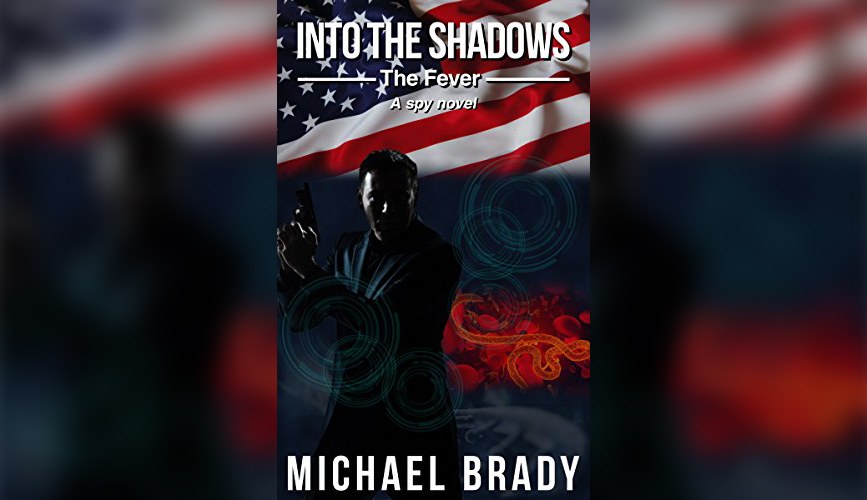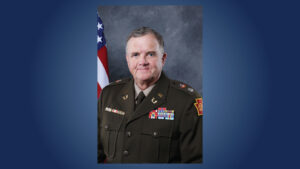
From managing threats to the homeland, to intelligence collection and emergency operations, Lt. Michael Brady U.S. Army (retired) brings much more to a first- time novel than your average spy enthusiast. Brady served as a career tactical and strategic intelligence officer for the United States. He was also the director of the Presidential Emergency Operations Center at the White House under George Bush during 9/11. The former Army Airborne Ranger is now retired from military intelligence, but is sharing his experiences and expertise through a new novel and by teaching cadets and students at his alma mater.
Brady, a member of The Citadel Class of 1990, writes a regular column for Asia Times. He is also the USA contributor to the Sunday Spy Show, an international podcast produced in the United Kingdom, and most recently, he has become a novelist.
The first in what may be a series of novels, Into the Shadows: The Fear, was released in late 2017. Amazon reviewers are calling it “gripping,” and an “outstanding read.”
“It reads more like an unredacted dossier,” says one Amazon reviewer.
The book is about a career undercover CIA officer, Michael Brennan, and his quest to identify and disrupt a plot crafted by the Islamic State terror group.
Brady recently answered some questions about Into the Shadows, and about his return to The Citadel to share his knowledge with future intelligence leaders.
Q. What led you to write Into the Shadows?
A. I wanted to write a compelling and thrilling series that creates realistic characters, believable story lines and insights into the men and women who operate in the shadows. It’s also designed for readers who want an action packed adventure where current and emerging national security issues and threats are examined and woven into the stories. Ultimately, I want my readers satisfied, curious and wanting more.
Q. How long did it take and what approach did you take to writing your first novel?
A. It took just under three months to write the initial manuscript. However, it took much longer to edit and refine it. My publisher and editing team were making changes until just a few weeks before the publication date. The approach I used was to let the scenes and characters guide me. I had a clear story in mind and simply let the characters take over. Finally, as a debut novelist, I wanted to be different than the thousands of other thriller and espionage writers so I focused on combining giving the reader a lot of insight into the intelligence community and how they are working to keep our nation free from current and future threats. I did, however, want to keep it as realistic and believable as possible while keeping the story going. I can only hope I found the right balance between what fiction readers demand while making the story and its characters believable. The market will determine if this is a unique approach and accepted by fans of the genre.
Q. The topic is timely –what real facts or historic events are embedded in the book?
A. Historical facts in the book include the 2014 Ebola outbreak in West Africa, and the Islamic State terror group’s occupation of many towns and cities inside Syria. Nearly everything in the book is real, including locations, agencies, intelligence assets, and capabilities. Only the characters are fictitious except for a couple of minor references in the book.
Q. What about your work as an intelligence officer contributed to the story line?
A. I was blessed to have served my country as a tactical and strategic intelligence officer for twenty years. The men and women I was honored to serve with are the inspiration to much of the story and future stories I’m currently writing.
Q. Is your main character, Michael Brennan, based on someone you know or knew and if so, who?
A. A nameless hero who shall remain in the shadows.
Q. You are writing a regular column for Asia Times, contributing to an international spy podcast, teaching at The Citadel, and now have a career as a novelist. How are you balancing this new phase of your life?
A. It’s challenging but rewarding. As a member of the newly formed Department of Intelligence and Security studies at The Citadel, I feel it’s important to contribute to today’s intelligence and security issues. I have generally worked on Into The Shadows books in the summers. However, I now find myself writing nearly daily and well into the evening hours. Promoting the book and participating in the marketing process is fun and I don’t see it as work. My girlfriend keeps me balanced and weekends are usually play time, unless, of course, I have a book signing or scheduled author event.
Q. You are teaching cadets at your alma mater, The Citadel. It must seem a bit surreal to be back on campus as a professor.
A. Oh, yes. The privilege to teach and inspire future generations of Citadel students is humbling and more rewarding than I ever imagined.
Q. What qualities should a young person possess to be successful in an intelligence career?
A. They must possess insatiable curiosity. A good intelligence officer is always asking why and wants to learn more. They must also exhibit courage and strength to report news that may not be what a policy maker or military commander wants to hear.
Q. How important is a college education when hoping to work for the CIA, FBI, or in military or corporate intelligence positions?
A. An undergraduate degree, at the minimum, is a requirement for the vast number of organizations and agencies that make up the intelligence community. These organizations want young men and women who exhibit strong critical thinking skills, and those are cultivated best in a multidisciplinary approach found in our programs at The Citadel. The private sector will also demand students with degrees, and in many cases, he or she should have advanced degrees for senior positions.
Q. What is a story about a lesson you learned along the way that you like to share with your classes?
A. The one that comes to mind occurred when I was at Ranger school in 1990. We had just set up a patrol base in the mountain phase and I was so tired that I left my rucksack open. And then it rained so I wore wet clothing in frigid conditions until I got too sick and was dropped from the class a few days later. I had to wait three years for another chance to return and earn my Ranger tab. The lesson: be fastidious in your duties. Even the seemingly little things can have a long-lasting impact if you try to take shortcuts.
Q. Is there anything else you would like to add?
A. Yes. I am proud of my military career, but any success I may have achieved in the past is the result of the superb men and women I had the privilege of serving and working with. Without them success would not have been possible.

 The Citadel earns the Community Engagement Classification from the Carnegie Foundation
The Citadel earns the Community Engagement Classification from the Carnegie Foundation Citadel professor to serve as next Inspector General for the U.S. Department of Defense
Citadel professor to serve as next Inspector General for the U.S. Department of Defense The Citadel recognized as Top 10 Military Friendly employer for 2026
The Citadel recognized as Top 10 Military Friendly employer for 2026

